A few weeks before the holidays, I was at a Christmas market. The merchants were selling beautiful handmade accessories and clothing. In one of the stalls, dedicated to colourful knitwear, I noticed a white sweater (a.k.a. jumper): long-sleeved, fitted & cropped. Emblazoned on the chest, in blue lettering, was the phrase, “Future MILF”. It was a quick glance as I walked by with my children but after, I couldn’t stop thinking who would buy and wear this sweater? It was likely not cheap since most of the other items at the market were handmade and priced accordingly (read: high), so unless money was no object, it would be an investment piece, something worn repeatedly rather than a gag gift for a baby shower, for example.
Would a pregnant person wear a cropped “Future MILF” sweater? Or a person who might one day have children who wants to make it clear they will always remain “sexy” & well, “fuckable”? When I googled the slogan + sweater, dozens of images came up, so this is not about this one sweater. (The image above is from Pinterest and although similar, is not the sweater I saw that day.)
I’ve posted something about MILF before on Instagram, in a series on “hyper-sexualized mom monikers” (others include SMILF, Yummy Mummy and Hot Mom). The other two categories I mentioned there were: desexualized mom monikers (mom bod, mum tum, mom jeans etc.) and capitalist/superhuman names (supermom, mum boss, momfluencer). And as I discussed there, there are a multitude of names for mothers and hardly anything in the same regard for fathers. (Think also how many there are for ageing women: crone, hag, cougar, spinster).
I’ve said it many times before and will again: language lives on the body. I have written about it in the context of translation and the multilingual mothers I interview for my research are physically and emotionally carrying the language for their children. But this also happens in monolingual homes: mothers are instructed to optimize their talk — for many mothers, language is emotional, moral and corporeal.
People wear clothing with messages, logos, phrases all the time, for better or often, for the worst of the worst (I will not link to anything here, but we can all think of many examples). A top with a slogan or message is nothing new. But what interests me here is the body as the medium for a message about the (maternal) body itself. So yes, the body is the medium and the message. (The “Medium is the Message” of course refers to the Marshall McLuhan phrase that means, how the message is conveyed, the medium, influences how the message is perceived.) And there is meaning in communication to consider: the sender tries to convey to the receiver who then infers or derives the meaning from the context.
I am of two minds on this one: if a person wants to wear a “Future MILF” sweater announcing they will not adhere to the desexualised-mother stereotype, perhaps it is their way of owning their sexuality, their body, their autonomy beyond motherhood (if the definition of MILF is about desire and sex, but more on definitions in a minute). On the other hand, a “Future MILF” sweater also sends the message that this person has internalised the horrifically sexist, damaging, and degrading attitudes toward women and mothers and is perpetuating the message that it is OK for society to judge mothers constantly and unjustly. For me, a good measure is to ask if fathers are wearing sweaters that affirm their desirability and hotness post-fatherhood. No, no they are not.
A couple of weeks after seeing this sweater, I finally received my Planned Parenthood “Bans Off Our Bodies” pin in the mail I ordered back in early November. When I wear it, I send the message I am pro-abortion, I believe abortion is healthcare and I think every person has the right to decide what to do with their own body. When I wear the pin, my (maternal) body is the medium that sends that message. In this way, the sweater and the pin are the same: responses to notions society has about controlling bodies of people with reproductive organs, women, and mothers. Both are responses to senders who are offering opinions (and creating laws!) about something they should never be discussing in the first place: other people’s bodies. If society wasn’t communicating notions that only some mothers are desirable post-motherhood, or that anyone else besides the owner of a body should have control of what happens to that body, we wouldn’t have these sweaters or pins.
As for that definition of “MILF”, I leave you with a poem by the wonderful author and poet Kate Baer from her newest collection, And Yet. Language change happens all the time and it is definitely time for a new definition of “MILF”. If “Mother I’d Like to Free” is it, I am all in and will wear the damn sweater!
As always, thank you for reading.
A couple of other fun, sort-of related facts:
· Wikipedia mentions the use of “MILF” in American Pie in reference to Stifler’s mom, played by the great Jennifer Coolidge! (I miss The White Lotus and congrats, Jennifer on the Golden Globe win!) I couldn’t find it to post here but I did see a meme in early January that said something like, “For 2023, less Kim Kardashian, more Jennifer Coolidge” and I wholeheartedly agree.
· On the topic of wearing your message, I enjoyed this article in The Walrus , “Our Totes, Ourselves”. Like most people, I have many totes with different slogans and messages and I often think about how the messages on the totes are a reflection of who I am, or not.
· And finally, because this newsletter is also about multilingualism, I did a quick search if and how other languages degrade mothers by using terms like “MILF”. I know, silly me. After coming across gross Reddit threads of men asking other men how to say “MILF” in other languages, I stopped. There will be far better and worthy topics on multilingualism in this newsletter soon.


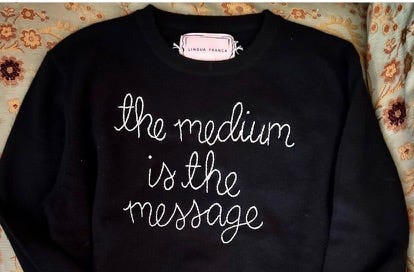

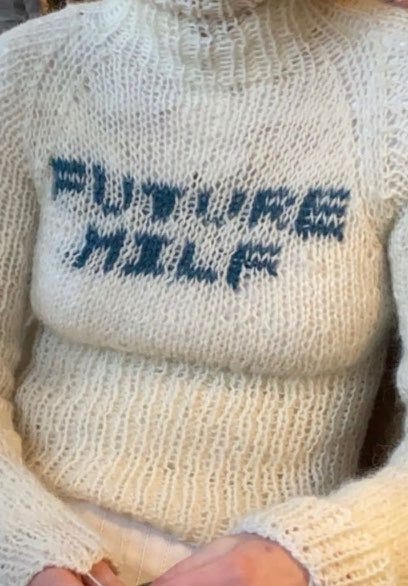
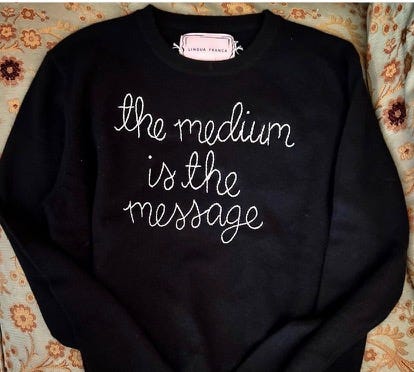
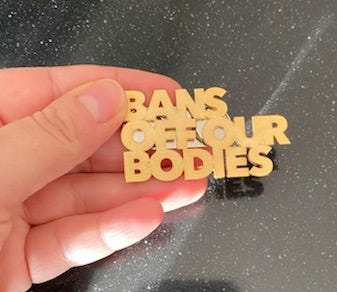
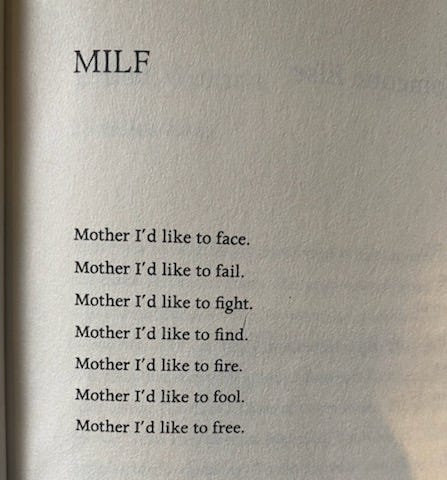
love this malwina!
Love the Medium is the Message